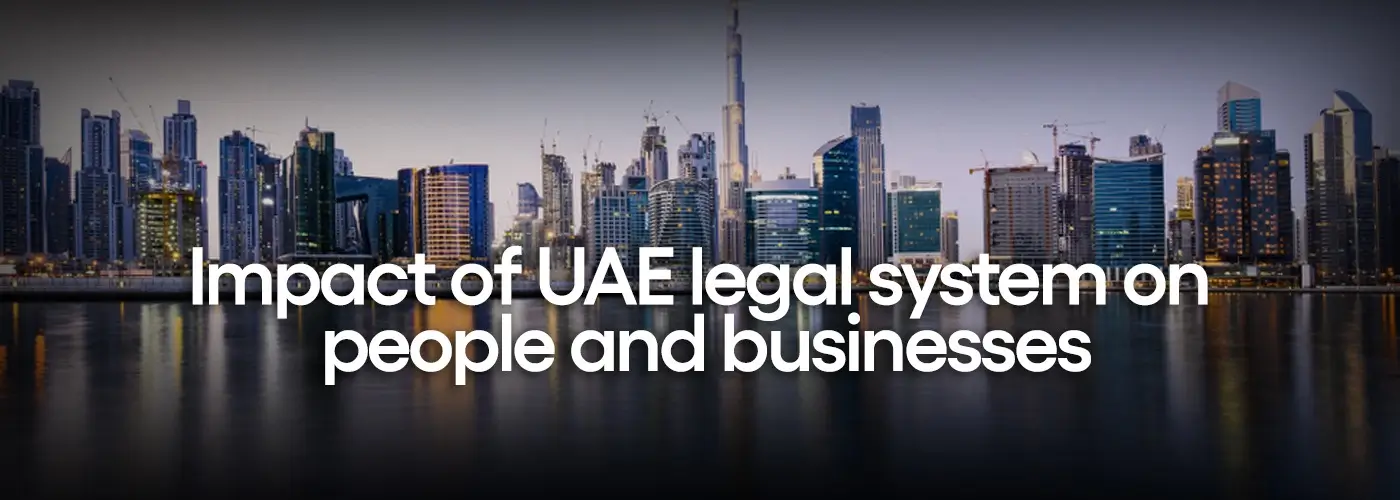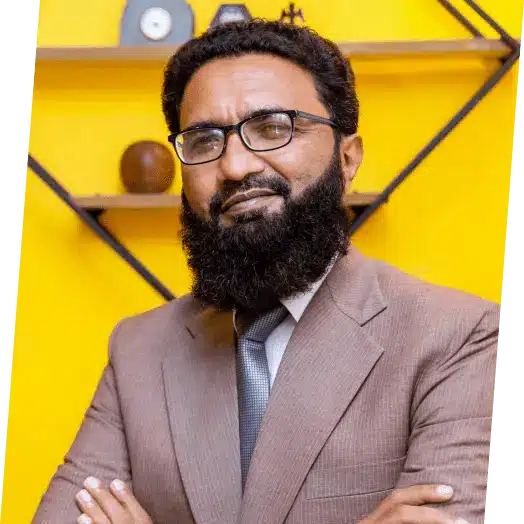The UAE legal system follows the constitution of the United Arab Emirates, a federation of seven trucial states. Islamic Sharia is the primary and supreme source of the UAE legislation. The law framework of the UAE includes local and federal courts, with a Supreme Court functioning in Abu Dhabi.
UAE’s court system is dual-nature, with lower courts applying higher courts’ judgments in similar cases. The constitution of the UAE dedicates its 5th section to the Union legal system. Article 94 of the UAE constitution describes that justice is the basis of authority.
In this article, we are highlighting the significance of the UAE’s legal framework on the general public. Also, we will briefly look into the kinds of the UAE legal system. Then, we will look upon the impact of the UAE law framework on the business sectors as well.
Evolution of UAE legal framework for the corporate sector
The UAE is modernizing its legal framework to promote innovation and corporate growth. These changes are positively impacting the economy and corporate sector. New technology is playing a significant role in shaping the future of legal practice in the UAE.
UAE Federal Decree Law no. 32 of 2021 allows foreign ownership in mainland companies, replacing the 2015 CCL provisions. It is boosting foreign direct investment, strengthening the economy, and fostering entrepreneurial growth. These are the areas where the evolution of the UAE legal system is transforming the business/technology landscape.
- Integration of AI in legal system
- Bankruptcy law reforms
- Commercial contracting
- Employment contracts
Now, we briefly look upon these transformational areas of the UAE legal framework.
Integration of AI in legal system
UAE’s legal modernization is greatly improving by integrating new technology such as artificial intelligence and blockchain, into legal processes. It is resulting in greater efficiency, less costs, and a more agile and accessible legal practice. The UAE is adopting legal technology to create smart contracts, eliminating intermediaries, and increasing transactional efficiency.
This shift reflects the country’s commitment to digital transformation, with legal reforms significantly impacting the economy and corporate sector. Relaxing of foreign ownership restrictions, and enforcement of bankruptcy and insolvency laws is providing able support. Integration of technology in the legal industry is revolutionizing the economic landscape, demonstrating UAE’s commitment to embracing the digital age.
Bankruptcy law reforms
The UAE has undergone significant legal reforms, including the amendment of Federal Decree Law No. 21 of 2020. Accordingly, it is enhancing the country’s approach to bankruptcy and insolvency laws, offering businesses greater flexibility and protection. In turn, it is boosting UAE’s economic resilience and foreign investors’ confidence.
The introduction of Federal Law No. 14 of 2018 by the UAE Central Bank is revamping the financial regulatory framework. It is promoting transparency and accountability in the UAE’s financial sector. Subsequently, it is fostering a robust financial ecosystem that supports greater business growth.
Commercial contracting
The UAE law allows freedom of contract, and parties can choose the law governing their contracts. Often, the international counterparts choose English law or DIFC or ADGM law for high-value contracts. So, they use DIFC or ADGM courts or arbitration in the DIFC-LCIA Arbitration Centre for disputes. However, these options are not suitable for public bodies or state-run corporations that require UAE governing laws and onshore courts.
Employment contracts
In the UAE, expatriates obtain residency visas through employment contracts with professional entities. Labour law governs onshore entities and free zones, focusing on the minimum rights. Dual employment contracts are common, with modern laws covering discrimination, parental rights, and flexibility.
Employers have to pay the salaries through a wages protection system. Basic employee rights include health insurance, timely increments, and end-of-service gratuity. The DIFC has transitioned to a third-party employee savings scheme from 2020.
Levels of the court system in the UAE
The judicial system in the United Arab Emirates operates at both federal and local levels. At the local level, each Emirate has its own court system and judicial departments. Whereas, the federal judiciary controls courts and departments across the country.
UAE courts available to the public include the Court of First Instance, Court of Appeal, and Court of Cassation. The Federal Supreme Court is the highest judicial authority in the UAE. Emirates of Sharjah, Fujairah, Ajman, and Umm Al Quwain are part of the Federal court system.
According to Article 104 of the UAE Constitution, local judicial bodies in each Emirate have jurisdiction in judicial matters not entrusted to the Federal judiciary. A decision from the Court of First Instance can be appealed to the Court of Appeal. Its judgment can be further appealed to the Cassation Court, or the Federal Supreme Court on limited grounds.
Components of the law system in the UAE
These are the constituents of the UAE legal system.
Let’s break down the parts of the legal system in the UAE.
Civil Law Framework
The UAE legal system is based on the civil law system, with a statutory code as its primary source of law. It has been significantly influenced by the Egyptian legal system, which has roots in French and Roman law. Islamic law, codified in Sharia, is also incorporated into UAE civil and commercial law.
UAE’s civil law system applies to the codification of laws and the judicial system’s practice. Judges do not typically hear oral arguments, and precedents are not judicially binding. Due to Dubai’s commercial center and the presence of international law firms with common law roots, many contracts in the UAE appear to be influenced by common law principles. This has created difficulties in applying the law to these contracts by the UAE’s courts.
UAE’s Judiciary
The UAE’s Federal Courts judges are appointed by the Supreme Council’s decree, with all judges being independent and subject to the law. Local judges, like those in Dubai, are appointed by the Ruler’s decree. Judges cannot be removed or terminated except for resignation, incompetence, or the end of their secondment.
Sharia Court
The Sharia courts in the UAE are responsible for civil matters between Muslims. They cover family matters like divorce, inheritance, custody, child abuse, and guardianship of minors. It is the Islamic court in the UAE and is heard by one judge, applying UAE codified law.
If no provision in the law exists, Islamic principles from the Islamic Sharia textbooks are applied. UAE’s Shariah courts act upon the Maliki and Hanbali schools of Islamic thought and jurisprudence. If no principles are applicable in either school, the judge must turn to the Shafi’i or Hanafi School, as stated in Article 1 of the UAE Civil Code. Non-Muslims are not allowed to appear before the Sharia court.
Civil and Criminal Courts
The UAE has two types of civil courts: civil courts and criminal courts. Civil courts handle various civil matters in the UAE. For example, private suits, debt recovery, banking, maritime, bankruptcy, intellectual property, company, and insurance.
Criminal actions in the UAE begin with a complaint filed with local police, who may gather statements from involved parties. The matter is then referred to the prosecutor for advice before registering claims. Criminal courts are governed by the UAE Penal Code and the UAE Criminal Law of Procedure.
Court of Cassation
The Court of Cassation is the highest court in the UAE, responsible for hearing legal matters and supervising lower courts. It sets out principles for lower courts to follow and provides guidance on their decisions. The UAE has a civil law legal system, so courts do not make law.
Court of Cassation judgments are often used by lawyers to persuade lower courts to rule in their favor. The Supreme Court of Cassation determines federal constitutional matters and UAE Constitution matters. Decisions from the Dubai Court of Cassation and Supreme Court of Cassation are typically coherent and uniform.
Conclusion
UAE has got stability, success, and cultural achievements on local, regional, and international levels. The United Arab Emirates has set an example for successful unification in modern history. Legal system of the UAE has seen sufficient evolution to gain local and international attention.
In its short period since its establishment, the UAE has made significant strides in regulating vital legal aspects. Consequently, this legal transformation of the UAE is playing its part in the rapidly expanding economy and financial growth. You can always consult KWS Legal Advisory for your individual and business-specific legal matters conveniently.
FAQs about the UAE legal system
These are the answers to the frequently asked questions about the UAE law system.
What is the common law system in the UAE?
The legal system of the UAE is based on civil law and Sharia law. Islamic Sharia law applies to Muslim personal status matters, and blood money compensation. Whereas, the status matters of the non-Muslims come under the civil law.
How do you describe the burden of proof in UAE law?
Article 1(1) and Article 1(2) of the UAE’s Evidence Law defines the burden of proof. The plaintiff must prove they are right in their accusations. While, the defendants must disprove the accusation, using relevant and acceptable facts.
What is the legal age in the UAE?
The legal age for maturity in the UAE is 18 years. Those who mature before this age cannot marry without the court authorization. Regardless of confirming an interest, they must meet certain criteria.
How do you describe the new evidence law in the UAE?
As per Article 86, the new evidence law of the UAE permits customary proof between litigants. Unless, it contradicts the public policy or is specific to the parties.



